Daily Vocabulary Words: List of Daily Used Words in Leading Indian Newspapers
Hi there. Welcome to this special section @ Wordpandit. Our endeavour here is straightforward: highlighting daily vocabulary words that you would come across in leading newspapers in the country. We have included the following newspapers in our selection:
• The Times of India
• The Economic Times
• Hindustan Times
• Mint
• Indian Express
We are putting in extensive work to develop your vocabulary. All you have to do is be regular with this section and check out this post daily. This is your repository of commonly used words; essentially, we are posting a list of daily used words. Hence, this has significant practical application as it teaches you words that are commonly used in leading publications mentioned above.
Visit the website daily to learn words from leading Indian newspapers.
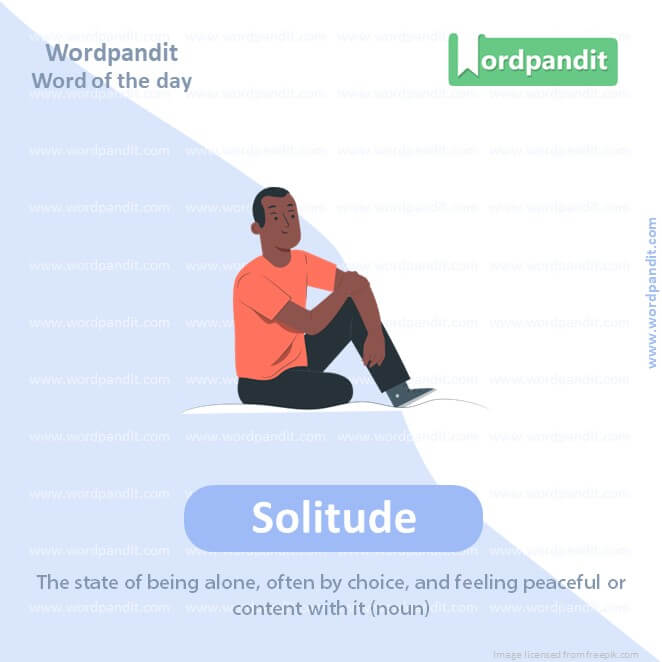
WORD-1: Solitude
CONTEXT: Loneliness and solitude. Two words which are often interchanged, though they are not just divergent in meaning but diametrically opposed.
SOURCE: The Times of India
EXPLANATORY PARAGRAPH: Imagine you’re in a room all by yourself, with no one else around. You’re not feeling lonely, but you’re just enjoying being alone, playing or thinking quietly. That’s what solitude is like. It’s like having a special time for yourself to think, read, or just relax.
MEANING: The state of being alone, often by choice, and feeling peaceful or content with it (noun).
PRONUNCIATION: sol-i-tood
SYNONYMS: Isolation, Seclusion, Loneliness, Solitariness, Privacy
USAGE EXAMPLES:
1. She enjoyed the solitude of her morning walks.
2. The cabin in the woods offered a perfect solitude for writing.
3. After the party, he sought solitude to gather his thoughts.
4. The artist found her creativity in moments of solitude.
WORD-2: Divergent
CONTEXT: Loneliness and solitude. Two words which are often interchanged, though they are not just divergent in meaning but diametrically opposed.
SOURCE: The Times of India
EXPLANATORY PARAGRAPH: When you and your friend choose different ice cream flavors, you are making divergent choices. Divergent means things that are different from each other or go in different directions, like choosing chocolate instead of vanilla.
MEANING: Moving or extending in different directions from a common point; differing from each other or from a standard (adjective).
PRONUNCIATION: di-ver-jent
SYNONYMS: Different, Varying, Dissimilar, Deviating, Contrasting
USAGE EXAMPLES:
1. Their opinions on the movie were divergent.
2. The two scientists had divergent theories.
3. The paths were divergent, leading to different villages.
4. Divergent interests led them to choose different careers.
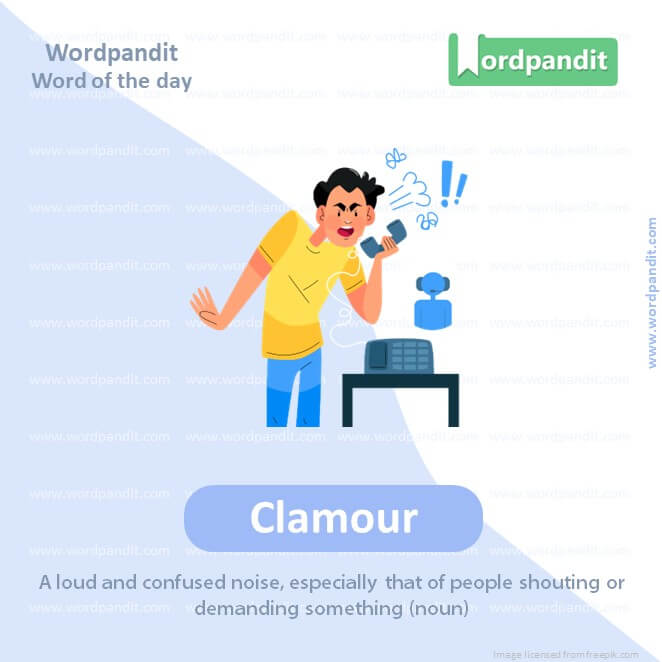
WORD-3: Clamour
CONTEXT: Loneliness is often associated with remote, unpeopled places. But, counterintuitively, the condition of feeling alone is most acutely felt in the clamour of overcrowded cities and urban spaces.
SOURCE: The Times of India
EXPLANATORY PARAGRAPH: Clamour is like when everyone in your class is talking loudly at the same time and you can’t hear your own voice. It’s a loud noise made by a lot of people or things, like when many kids are playing and shouting in the playground.
MEANING: A loud and confused noise, especially that of people shouting or demanding something (noun); to loudly demand or shout (verb).
PRONUNCIATION: klam-er
SYNONYMS: Uproar, Din, Racket, Hubbub, Commotion
USAGE EXAMPLES:
1. The clamour of the crowded market was overwhelming.
2. The fans raised a clamour for an encore.
3. She could hear the clamour of the children in the yard.
4. Protesters clamoured for justice outside the courthouse.
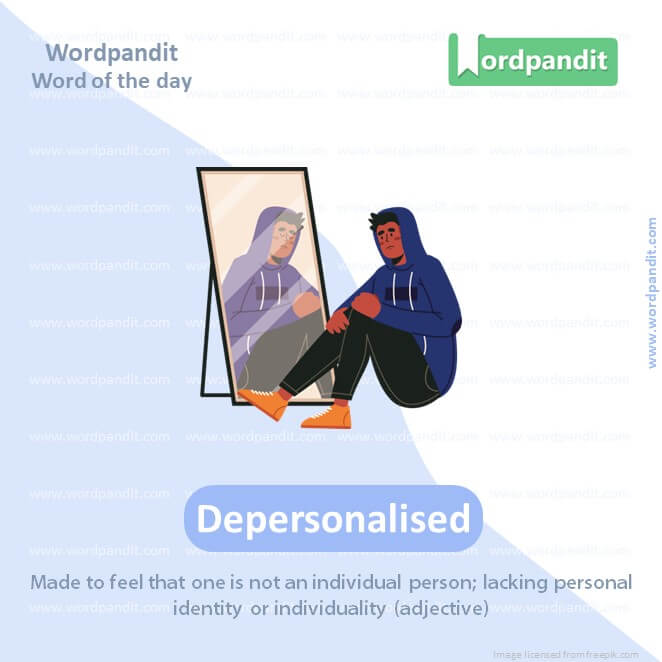
WORD-4: Depersonalised
CONTEXT: With increased urbanisation and the population shift from rural regions to cities, there is a spreading sense of being depersonalised in the midst of faceless crowds.
SOURCE: The Times of India
EXPLANATORY PARAGRAPH: Imagine if someone treated you like you were just a number and not a special person. That’s what depersonalised means. It’s when someone makes you feel like you’re not important or unique, like you’re just part of a crowd and not special.
MEANING: Made to feel that one is not an individual person; lacking personal identity or individuality (adjective).
PRONUNCIATION: dee-pur-suh-nuh-lized
SYNONYMS: Impersonal, Dehumanized, Unpersonalized, Detached, Disconnected
USAGE EXAMPLES:
1. The large class size made her feel depersonalised.
2. In a depersonalised society, individuals often feel lost.
3. The customer service was so automated that it felt depersonalised.
4. The worker felt depersonalised in the vast corporate structure.
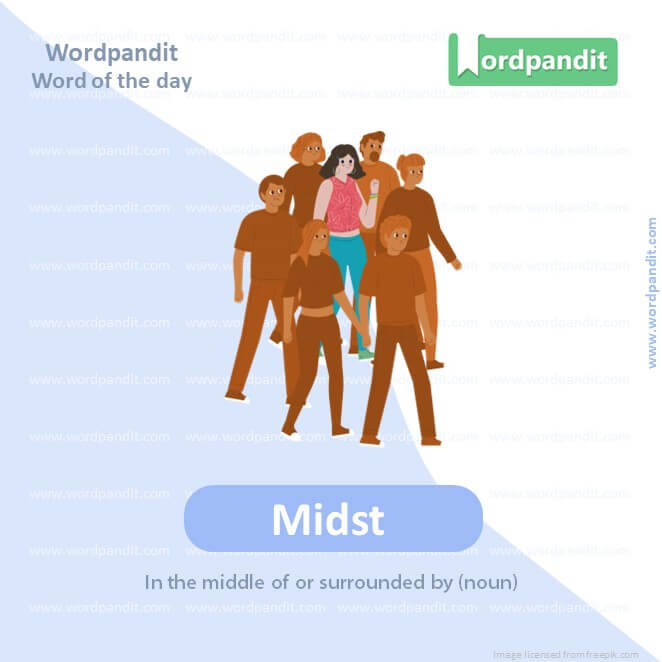
WORD-5: Midst
CONTEXT: With increased urbanisation and the population shift from rural regions to cities, there is a spreading sense of being depersonalised in the midst of faceless crowds.
SOURCE: The Times of India
EXPLANATORY PARAGRAPH: Midst is like being in the middle of something. If you are playing a game and it’s not the beginning or the end, but right in the middle, that’s being in the midst of the game. It’s like being surrounded by things or people all around you.
MEANING: In the middle of or surrounded by (noun).
PRONUNCIATION: midst
SYNONYMS: Middle, Center, Heart, Core, Thick
USAGE EXAMPLES:
1. In the midst of the forest stood an old tree.
2. She found herself lost in the midst of her thoughts.
3. The city was in the midst of a festival.
4. He remained calm in the midst of chaos.
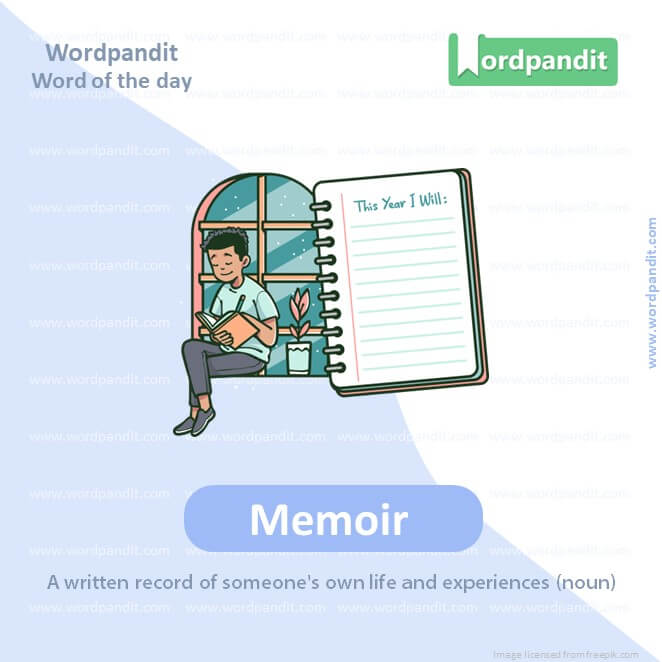
WORD-6: Memoir
CONTEXT: In her memoir, The Lonely City, Olivia Lange has written about her move to New York City, “that teeming island of gneiss and concrete and glass”: “What does it mean to be lonely? How do we live if we are not intimately engaged with another human being? How do we connect with other people…Is technology helping, does it draw us closer together or trap us behind screens?”
SOURCE: The Times of India
EXPLANATORY PARAGRAPH: A memoir is like a special book that someone writes about their own life. They tell stories about what they did, who they met, and how they felt about things that happened to them. It’s like a diary, but it’s a book for other people to read.
MEANING: A written record of someone’s own life and experiences (noun).
PRONUNCIATION: mem-wahr
SYNONYMS: Autobiography, Recollections, Reminiscences, Life story, Personal history
USAGE EXAMPLES:
1. She published a memoir of her childhood.
2. His memoir included stories from his travels.
3. The actress’s memoir was filled with interesting anecdotes.
4. He read his grandfather’s memoir to understand his life.
WORD-7: Penitentiary
CONTEXT: Maria Popova, who edits the online journal, The Marginalian, has likened loneliness to “a suffocating penitentiary in which one’s inner scream becomes deafening, deadening, severing any thread of connection to other lives.” A description which vividly evokes Edvard Munch’s famous painting of a face, mouth agape in a silent howl of isolated anguish.
SOURCE: The Times of India
EXPLANATORY PARAGRAPH: A penitentiary is a place like a big school where people are sent when they have done something really wrong, like breaking a big rule. But instead of learning math or reading, they learn how to be better people so they won’t break rules again.
MEANING: A prison for people who have committed serious crimes (noun).
PRONUNCIATION: pen-i-ten-she-air-ee
SYNONYMS: Prison, Jail, Correctional Facility, Detention Center, Reformatory
USAGE EXAMPLES:
1. The criminal was sent to the penitentiary.
2. The old penitentiary was converted into a museum.
3. Stories from the penitentiary were quite harrowing.
4. He worked as a guard in the penitentiary.
WORD-8: Severing
CONTEXT: Maria Popova, who edits the online journal, The Marginalian, has likened loneliness to “a suffocating penitentiary in which one’s inner scream becomes deafening, deadening, severing any thread of connection to other lives.” A description which vividly evokes Edvard Munch’s famous painting of a face, mouth agape in a silent howl of isolated anguish.
SOURCE: The Times of India
EXPLANATORY PARAGRAPH: Severing is like when you cut a piece of string into two parts. It means to cut something off completely or to separate it from something else. Like when you use scissors to cut paper into two pieces, you are severing the paper.
MEANING: Cutting off or apart; completely separating one thing from another (verb).
PRONUNCIATION: sev-er-ing
SYNONYMS: Cutting, Dividing, Detaching, Slicing, Dissecting
USAGE EXAMPLES:
1. The storm resulted in several trees being severed from their roots.
2. Severing ties with the company was a difficult decision.
3. The chef was skilled at severing meat from the bone.
4. The accident caused severing of the power line.
WORD-9: Evokes
CONTEXT: Maria Popova, who edits the online journal, The Marginalian, has likened loneliness to “a suffocating penitentiary in which one’s inner scream becomes deafening, deadening, severing any thread of connection to other lives.” A description which vividly evokes Edvard Munch’s famous painting of a face, mouth agape in a silent howl of isolated anguish.
SOURCE: The Times of India
EXPLANATORY PARAGRAPH: Evokes is like when something makes you remember or feel something. Like when you smell cookies and it makes you think of your grandma’s house, or when a song makes you happy or sad. Evokes means to bring a memory, feeling, or image into your mind.
MEANING: Brings to mind a feeling, memory, or image; causes to be remembered or felt (verb).
PRONUNCIATION: ee-vokes
SYNONYMS: Conjures, Induces, Stimulates, Elicits, Provokes
USAGE EXAMPLES:
1. The old photograph evokes fond memories.
2. The smell of the ocean evokes childhood summers.
3. The music evokes a sense of peace.
4. Her story evokes deep emotions.
WORD-10: Agape
CONTEXT: Maria Popova, who edits the online journal, The Marginalian, has likened loneliness to “a suffocating penitentiary in which one’s inner scream becomes deafening, deadening, severing any thread of connection to other lives.” A description which vividly evokes Edvard Munch’s famous painting of a face, mouth agape in a silent howl of isolated anguish.
SOURCE: The Times of India
EXPLANATORY PARAGRAPH: Agape is when your mouth is wide open because you’re really surprised or amazed. Like when you see a huge birthday cake with your favorite cartoon on it, and your mouth opens wide because you’re so excited and surprised!
MEANING: Having the mouth wide open in surprise or wonder (adjective).
PRONUNCIATION: uh-gah-pay
SYNONYMS: Open-mouthed, Astonished, Amazed, Bewildered, Aghast
USAGE EXAMPLES:
1. The children watched the magic show with mouths agape.
2. He stood agape at the stunning view.
3. The audience was agape at the unexpected finale.
4. She was left agape by the sudden revelation.
Vocabulary SSC
Navigating the path to success in competitive examinations like the Staff Selection Commission (SSC) triggers a keen focus on ‘vocabulary SSC’. This collection of words, often prominent in SSC examinations, holds paramount importance, and forms a significant part of a candidate’s linguistic preparation. However, mastering ‘vocabulary SSC’ is a process that requires deliberate strategy and dedication.
To begin the journey with ‘vocabulary SSC’, a structured learning regime is key. Break the learning process into manageable chunks. Concentrate on a set number of words each day. This steady, consistent approach reduces the risk of burnout and enhances long-term retention of vocabulary.
The strategic use of memory aids can significantly boost the learning of ‘vocabulary SSC’. Utilize flashcards, memory apps, or even create personal mnemonics to help remember each word and its meaning more effectively. Associating a word to a personal event or object creates a lasting mental connection, making recall easier.
To truly master ‘vocabulary SSC’, it’s crucial to engage with the words in different contexts. Incorporating the words into daily reading and writing practices provides exposure to their usage in varied situations. This practical application reinforces the understanding of ‘vocabulary SSC’, enhancing the ability to employ these words accurately in the exam setting.
Regular revision is a must when preparing ‘vocabulary SSC’. Spaced repetition, interspersing the study with regular breaks, and regularly revisiting the words learned, ensures the words stay firm in your memory, ready to use when needed.
In essence, preparing ‘vocabulary SSC’ is an exercise in action-oriented constant learning. Strategic use of learning tools, practical application, and regular revision are key aspects of getting a grip on ‘vocabulary SSC’. As you stride through this process, you inch closer to acing your SSC examinations with an enriched vocabulary and boosted confidence.













